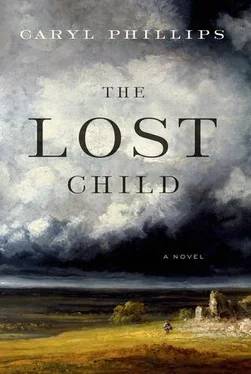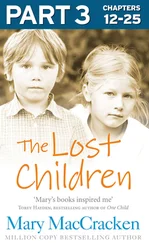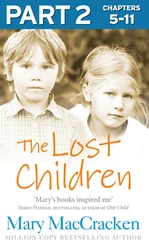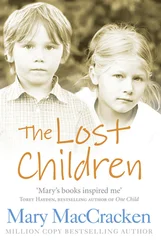Having reached their destination, she lies down on a handful of straw in a tiny room under the low roof. The broken windows are stuffed with brown paper and scraps of besmirched fabric, but the cacophony of noise still penetrates. She receives the drunken tidings of night, and she understands that the doglike howling and yelping from the Flying Horse Inn, which at all hours teems with degraded humanity, will persist until dawn. But what can she do? The wooden stairs that lead to this bleak attic room begin to creak, but she is not expecting anyone. (Is someone there?) Her son lifts a small finger to his lips and encourages her to be quiet. The dank wall is made visible by candlelight, and extended across its full breadth she can see the shadowy image of the boy’s furtive gestures, but the intermittent rubbing of her irritated eyes now results in her closing them tight.
It hasn’t always been this way. Before, having pushed back her wooden chair and swathed herself in a moth-eaten shawl, each evening she would set forth and leave behind the rattling and clacking of the looms. And each evening she would assume that this must be the day on which the lonely man has had to return to his inconvenient wife and children, but for almost a week her suitor has confounded her expectations and waited patiently by the gates with a small bunch of freshly picked flowers, which he presents to her with more extravagance than is necessary in the hope of gaining her approval. He walks with her and talks, and he understands that she is not blessed with pretty features, and he suspects that she would most likely freely admit this, but he knows that she possesses elegance, although undoubtedly some men see only a harlot as common as the dirt under their feet, a lamentable object they might use for either commerce or humour. He has seen these men, the desire for entertainment gleaming in their faces as they greedily watch the commotion of her dress against her hips. She steps back out of range as a large carriage with heavy wheels carves its way through the busy street and awakens clouds of dust, and then she walks, and he walks with her, and again he tries to solicit conversation, and finally, after a five-day campaign, she reluctantly agrees to accompany him to the back room of the Queen’s Head tavern for supper.
They sit. There is no linen upon the table, and a narrow bed stands in one corner, but mercifully no eyes are upon them. (You must dine heartily, and I promise you will soon reap the benefits of doing so.) She accepts oatcakes and a little boiled mutton, and the serving boy brings chicken pie, beans, and a glass of Burgundy for her host, before ceasing his capering and once again closing in the door. (I am a man of some influence who has not yet entered the evening of my mortal span, yet I confess to being bedevilled of late by unpredictable bouts of melancholy.) His breath is unsavoury, but this aside, there is an inoffensive fragrance to the man in whom she discerns goodness. He is endowed with courtesy and displays a great delicacy of manners, and he seeks to engage her with his wit and not tax her with wearisome tales relating to his own standing. He admits to being puzzled by her situation but essays an observation. (A third homeland in one lifetime, and now you are intoxicated with liberty and perhaps thirsting for enlightenment? Does this represent your predicament?) She smiles. Not entirely. She admits to having been discarded by a sea captain and living without daylight in a place where to draw breath is to risk ruination, and he immediately offers her money with which she might obtain decent lodgings, but she refuses. (But you reside among whores and ruffians in the vile courts of this sometimes pestilent town.) She sees the frustration rise in his body, but she continues to smile.
She opens her eyes, for she can hear the rasping voice of a drunken ballad singer competing with that of a deep-throated pie vendor, both of whom congregate below in the echo chamber that is the narrow courtyard. The boy has squeezed himself against the wall, and the wood groans as the landlord now lumbers across the crooked floor. A simple scrap of carpet would have assisted with the chill, but it is too late. She watches the animated glow from the man’s swinging lantern as the light searches for her figure. (Have you heard from your gentleman?) The landlord’s slovenly wig has slipped sideways, and his forehead wears a circumspect frown. Her child crawls to her side and holds her arm. He looks defiantly at the man with ill-disguised scorn lighting up his young eyes, but his mother reassures him. (It’s alright.) Seven bitter winters have passed since her son shouldered his way into the world on these grimy, uneven boards. Her gentleman paid for the doctor, but she worried that her child’s father might now uncouple his affection as a result of the taint in his offspring’s breeding. The landlord moves his lamp to improve his view of her face, which is coated in sweat as thick as oil. This man once radiated understanding, but his disposition is now much altered. He asks her, How many weeks must I wait? She no longer possesses the strength to draw her tongue across the speckling of blood on her mouth; she no longer enjoys the ability to smile.
* * *
The first time she saw the ghost quietly leaving her body she shook with fear, but he quickly reentered her. The ghost appears and disappears stealthily, like a halo of breath on a looking glass. She knows that soon the ghost will leave her frail body, and this time she will utter a series of long, shallow gasps and fall silent, and then follow him and begin her final voyage. But not yet. A single candle gutters in the draught, but its shimmer illuminates the obscurity allowing her to watch over her sleeping child, and again she feels her consciousness slipping away and the worrisome present subsiding into a peaceful dream. She lowers her heavy lids and abandons vigilance.
During their first apprehensive dinner her gentleman had been careful to admit to her that as far as ardent passions were concerned he was something of a novice. But by their second meal together she could observe it in his aspect that he felt emboldened. A small fire was her gentleman’s gift of comfort to her, and they both studied the tiny flames as the serving boy added fresh logs and then raked up the loose waste from under the grate. After the boy closed in the door, her gentleman friend stood and crossed the room and drew the bolt. She could see that he was nervous, and some crumbs clung stubbornly to his chin, but he had forsaken drinking while he still remained in full custody of his sensibilities. She looked favourably upon him, convinced that integrity and kindness were lodged in his bosom. He removed his satin vest and lace ruffles with impeccable dexterity, which helped to soothe her own nervous condition. Then he came to her with the honest ardour of youth, and she made an earnest attempt to return his interest.
Although the considerate man took his time and let his fingers gently explore the soft curves of her body and whispered to her throughout, she was unable to prevent her mind from collapsing under the stress of memory. She found herself back on the ship with the captain stirring himself to quick, frenzied spasms, after which she was confined to her corner, where she prayed that he might now leave her alone. A civil frigidity entered the captain’s voice as he commanded her not to submit to sulkiness, and then one morning the exasperated man ushered her to the foot of a steep staircase and then to the upper level, where she experienced a change of air. He pressed a guinea into her palm and, the ship having docked in the night, he pointed to the great port that lay spread out before them and turned her loose to find an occupation and seek shelter. It was some while before she moved off from the docks, being unsure if she was at liberty to walk abroad, and after a few hours of edging her uncertain way along bustling streets, a forthright workingwoman, with a fine white cloud of hair, came to her aid and made it her objective to help this lost soul reclaim her grit and establish a new home in this clamorous town of ships and sailors.
Читать дальше












